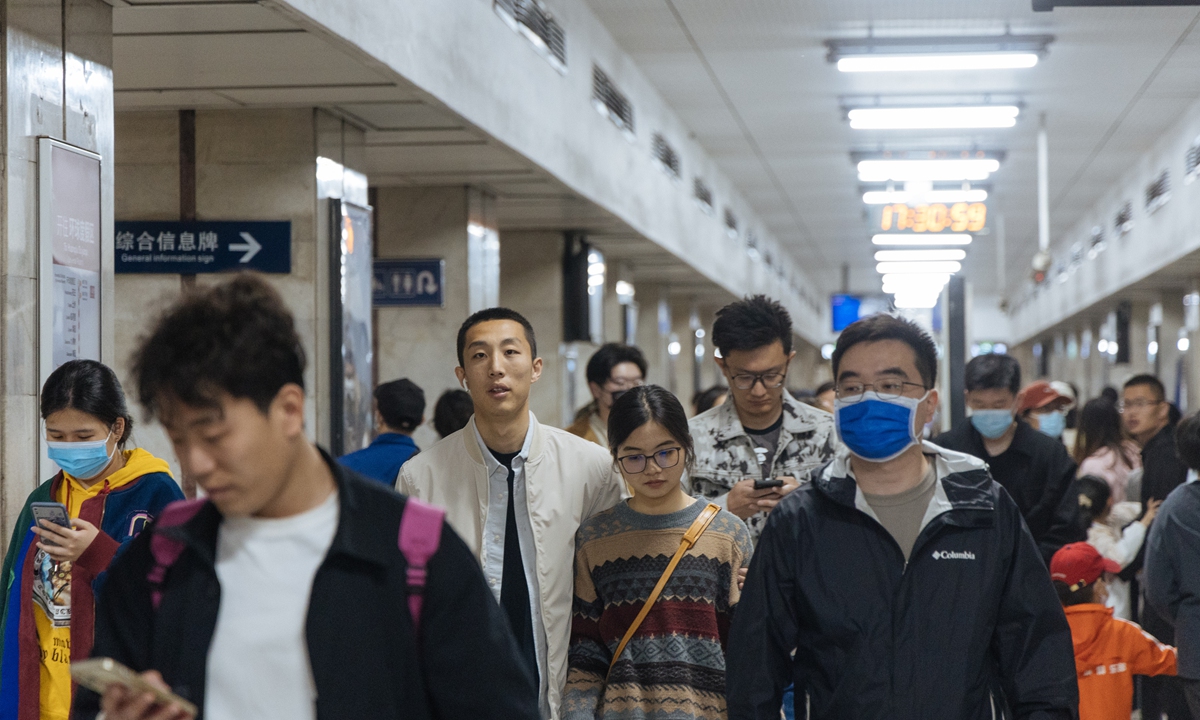
Some passengers are seen without masks in the Beijing subway station on April 16, 2023. Beijing's subway has dropped mandatory mask requirements for passengers, local media reported on the day. Photo: Li Hao/GT
A rising number of COVID-19 reinfection cases in China have caused public concern over whether there will be a new wave of the virus. Experts have noted that the epidemic situation is on a slow upward trend, but there will be limited disruption on everyday life.
Many people have developed symptoms including sore throats and are concerned that they may have been reinfected. Wang Guiqiang, director of the infectious disease department of Peking University First Hospital, said there were many potential reasons behind a sore throat and that individuals should remain objective, according to the National Health Commission.
COVID-19, influenza and other bacterial infections can all cause a sore throat and should all be treated differently. If a person becomes infected with COVID-19, the person should be treated as a COVID-19 patient, according to Wang.
The current prevalent XBB variant is a recombinant variant of Omicron, which has higher transmissibility and immune escape capacity than the Omicron variants prevalent in previous waves, but there was no significant change in pathogenicity, health authorities stated.
"It will be the epidemiological feature of COVID-19 that people may become reinfected at different times, but there will be less impact toward their lives," Lu Hongzhou, head of the Third People's Hospital of Shenzhen told the Global Times on Friday.
We just experienced a peak infection about half year ago, with more than 90 percent of the population becoming infected, building wide herd immunity. Although the effect of herd immunity will gradually decrease as new variant strains emerge, herd immunity still plays an effective "barrier" role in preventing the virus spreading, Lu explained.
It has been about six months since the last mass wave of infections, and many people's antibodies are gradually disappearing, and it is suggested to take booster shots based on the vaccine plan issued by the national health authorities, Lu said.
In Beijing alone, the top five diseases reported in the city for the week between May 15 and 21 were COVID-19, other infectious diarrheal diseases, influenza, tuberculosis and viral hepatitis, accounting for 98.9 percent of the reported cases of notifiable infectious diseases, according to the Beijing CDC on May 24.
It is a rule of science that a second wave of COVID-19 has occurred in every country monitoring the epidemic without exception, Zhang Wenhong, director of Infectious Diseases Department at Huashan Hospital, Fudan University told media recently, media reported. As public immunity is weakened and the virus mutates, however, it has less severe symptoms generally and there is more effective response from medical resources, according to Zhang.
Zhang said that it should not be an obstacle to people's normal life and people should not overreact.
China's top respiratory disease expert Zhong Nanshan said that China-developed vaccines covering the XBB variant are expected to be available soon. We have predicted that there was a small peak in COVID-19 infections in late April and early May, Zhong said during the Greater Bay Area Science Forum on May 22, according to the Shenzhen Economic Daily.
The country is predicted to face a peak at the end of June, with about 65 million people infected with COVID-19 each week, according to Zhong. But Zhong also noted that it's predicted based on model calculation, which might not be accurate.
China's National Health Commission in April unveiled the latest plan for COVID-19 vaccination, aiming to increase the immunity levels across certain groups and reduce the risks of severe infection and death caused by the virus.
Global Times




